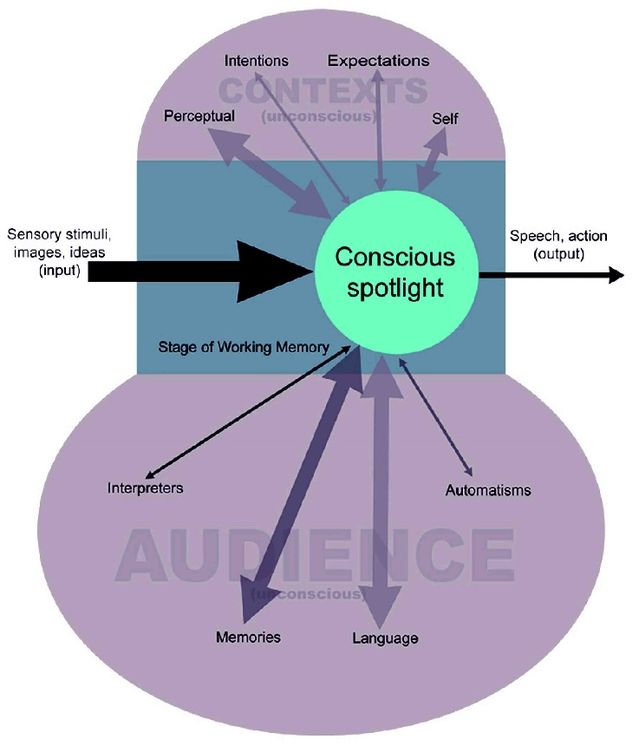NickGaspar wrote: ↑June 14th, 2021, 10:57 amWilliam James description is interesting but I will skip it for now to address your question.
You wrote that:" What I mean by "brute/raw experience" is experience which occurs independently of whether or not its subject is aware or conscious of it, and my question is whether such nonconscious experience is possible, and whether it is still experience rather than nonexperience."
-Well to answer that question we need to agree on the meaning of the word "experience". From what I understand an experience is a the process where a stimuli forces an organism to react consciously or unconsciously.
A great example on a behavior caused by an unconscious experience is our habit to touch our face hundred of times during a day (a huge problem during a pandemic). We do it unconsciously mainly as a result of unconscious stimuli created by itches and tickles felt on our skin.
Unconsciously I "choose" which letters I have to strike to compose this reply...while I consciously try to compose my thoughts!
Unconsciously I am irritated by a loud noise outside my window. Unconsciously I become hostile to a different group of people due to an underlying bad smell in a room(Social experiments).
The number of experiences our organisms address unconsciously is many far greater then the conscious ones.
Now a Cataleptic Impression is not an unconscious experience, so maybe I am talking something completely different when I address "brute/raw experience."
Its an experience which is processed by our conscious state but either the specific area of the brain that stores that is not "on line" or no previous experience resembles this new one. This results to n experience without a narrative or content for a brief moment.
Soon enough the rest of our high cognitive systems kick in and ''fabricate" a narrative. This is common with Religious and spiritual experiences.
By "experience" I mean "first-person", subjective experience, subjective mental content (qua possible object of introspection), i.e. inner "impressions and ideas [images]".
(Impressions are
"all our sensations, passions and emotions, as they make their first appearance in the soul. By ideas I mean the faint images of these in thinking and reasoning." – D. Hume)
There is no doubt that perceptual states can be (phenomenally) nonconscious in the sense of lacking any subjective experiential content. (Phenomenally) Nonconscious perception is perception without subjective sensation. Actually, most (neuro-)cognitive processes don't involve phenomenal consciousness.
The phrase "nonconscious experience" is ambiguous between
"phenomenally nonconscious experience" and
"(phenomenally conscious) experience of which its subject is not cognitively/perceptually conscious (aware)". In the first sense the phrase is a contradiction in terms, since an experiential state is a phenomenally conscious state
by definition; but in the second sense it is not, because in this sense a nonconscious experience is an
unknown (uncognized/unperceived/unattended/unnoticed) experience.
When it is asked whether nonconscious experience is possible, the phrase "nonconscious experience" is used in the second sense: Must experience be known (by its subject) in order to be had or undergone (by its subject)? Does the "givenness" of experience (to its subject) depend on its knownness (by the subject)?
Locke defines "consciousness" as
"the perception of what passes in a man's own mind." Leibniz calls this inner perception of one's conscious mind
"apperception":
"It is well to make the distinction between perception, which is the internal state of the monad representing external things, and apperception, which is consciousness or the reflexive knowledge of this internal state itself and which is not given to all souls, nor at all times to the same soul." (G. W. Leibniz, Principles of Nature and Grace, 1714)
And in Latin he defines
"apperceptio" as
"perceptio melior, cum attentione et memoria coniuncta" ("better/enhanced perception conjoined with attention and memory").
I now strongly tend to believe that there is no "brute" or "raw" experiential "givenness", i.e. no experience without any apperceptual "takenness" and knownness—which is to say that totally noncognized experience is nonexperience.
Interestingly, according to the global-workspace model of phenomenal consciousness, its experiential content is identical with the access-conscious nonconceptual content of the global workspace aka working memory. (
"Working memory is thought to provide a central 'workspace' in the mind." – P. Carruthers) And working memory cooperates with the cognitive module responsible for attention.
Accordingly, one can say that experiential states are apperception-dependent in the sense that there is nothing experiential or "impressive" about them unless their qualitative contents ("qualia") are apperceived by being part of the attended contents of working memory. Attention comes in different degrees, but degree zero means the absence of attention and thereby the absence of phenomenal consciousness; so attention (some minimal nonzero degree of it at least) is necessary for phenomenal consciousness. Totally non-(ap)perceived, non-cognized experience is non-experience!
Sounds pretty plausible to me…


















































